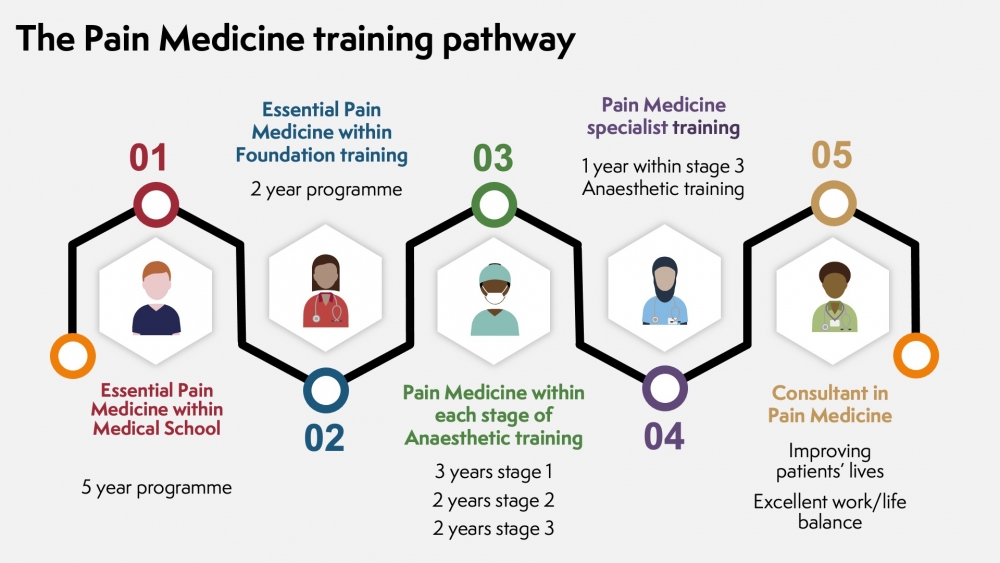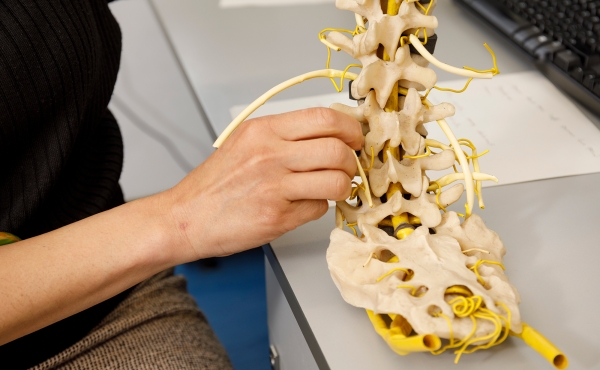Training and Curricula
Pain Medicine training is part of the CCT in Anaesthetics
There are modules for Stage 1, Stage 2, and Stage 3 Pain Training, which all anaesthetists undertake. Beyond this there are modules for Stage 3 Special Interest Area (SIA) Pain Training, which are undertaken by Pain Medicine specialists.
The 2021 Anaesthetics curriculum has introduced Pain Management as mandatory specialist domain with 3 stages of pain training replacing basic, intermediate and higher training within the old 2010 Anaesthetics curriculum.
Specialist pain training in the UK now consists of Stage 1 Pain training from CT1 to CT3; Stage 2 Pain training ST4 to ST5 and Stage 3 Pain Training ST6 to ST7. There are no minimum number of procedures or sessions required for the completion of the respective stages of Pain training. The HALO sign off will depend on the evidence gathered with SLEs and other information/activities supporting the achievement of the key capabilities and learning outcomes. This may be followed by a 6 month indicative period Stage 3 SIA in Acute Inpatient Pain to practice as an Acute Inpatient Pain Consultant or a 12 month indicative period Stage 3 SIA in Pain Medicine to practice as a Pain Medicine Consultant.
For further information on the 2021 Anaesthetics curriculum click here.
The Faculty has produced guidance for pain training in the 2021 curriculum which can be viewed here.

Click below to find more information on each of the different stages of pain training.
Stages of training
This is a compulsory area of training during the early stages of the Anaesthetic CCT. The aims are to ensure trainees are competent in the assessment and effective management and of acute post-operative and acute non post-operative pain. They should also have the necessary knowledge to provide a basic understanding of the management of chronic pain in adults.
This is also another compulsory area of training in the Anaesthetics CCT and aims to build on the competencies gained during Stage 1 Pain Training. The trainees should become fully competent in the assessment and management of acute surgical, non-surgical and acute on chronic pain in most patient groups and in most circumstances. Trainees should have a knowledge of the assessment, management and wider treatment for chronic and cancer pain patients as well as the need for multi-professional input in such cases. Trainees should also be an effective member of the acute pain team.
Please click here for more information on Stage 2 Pain Training
Read about Stage 3 Pain Training here.
Read about Stage 3 SIA Pain Training here.
Read about Paediatric Pain training and retraining here.
Applications for Out of Programme Training should be undertaken using this form and discussed at the earliest opportunity with your local trainers and the Regional Advisor in Pain Medicine.
Trainees who are planning to undertake training in pain medicine in an overseas post are strongly advised to seek advice from their Regional Advisors in both Anaesthesia and Pain Medicine at an early stage. At present it is likely that overseas training would still count towards Stage 3 and Stage 3 SIA Pain Training but it is absolutely essential that:
- prospective approval is obtained;
- a detailed logbook and portfolio is kept during the overseas period;
- verification that the training has been completed successfully is obtained from the Head of Department in the overseas institution; and
- certification of competency to the standard of advanced pain training is obtained from the Regional Advisor in Pain Medicine in the UK.
Overseas training will be assessed against the criteria for outcomes based training as described in the CCT Training Documents. The criteria for outcomes based training are the same irrespective of where training is undertaken.
Do you have to do Stage 3 and Stage 3 SIA level training?
Stage 3 Pain Medicine training may be a standalone optional experience for those wanting a career as part of an acute/inpatient Pain Medicine team. Trainees embarking on a Pain Medicine career with substantial commitment undertake an advanced year and usually spend this in a single tertiary pain centre, or a number of units each with differing educational opportunities. During this, training experience is gained in consultation skills, pain procedures and learning how to manage a clinic.
What exposure is there to other specialties?
All Stage 3 SIA trainees are encouraged to spend time in clinics with other allied specialties, for example rheumatology or neurosurgery, gaining insight into diagnosis and management in these respective specialties. We are also given the freedom to develop ‘special interests’ in pain medicine from ‘dropdown’ parts of the Stage 3 SIA Pain Medicine curriculum in paediatric Pain Medicine, cancer Pain Medicine and spinal cord stimulation.
Examination
The FFPMRCA exam was established in 2012 covering both practical clinical knowledge and knowledge of relevant sciences. It is similar in structure to the final FRCA with an initial written exam consisting of MTF (multiple true/false), SBA (single best answer) and EMQ (extended matching questions). If that is passed, it is followed by two structured oral examinations: one clinical and one on relevant basic sciences. The aim of the examination is to enhance the practice of Pain Medicine in the UK and ultimately benefit patient care.
Having completed this new robust training scheme, pain trainees are entering into the ever changing and expanding field of Pain Medicine practice.
Further Reading
Are you currently undertaking pain training?
Register with the Faculty to receive additional updates and connect with your fellow trainees!



